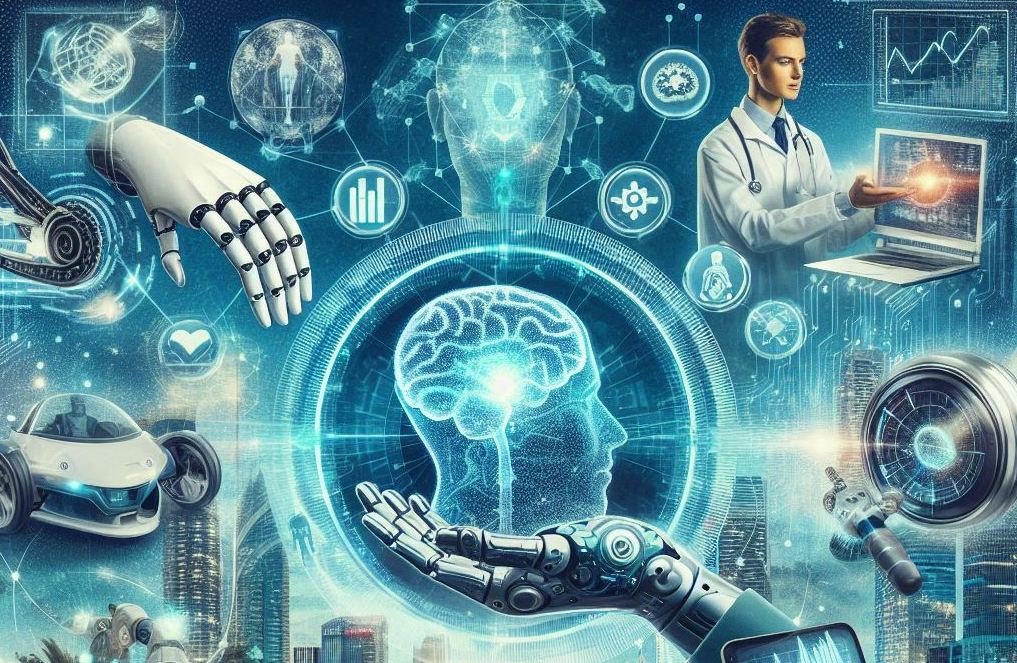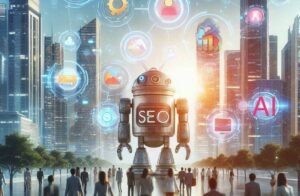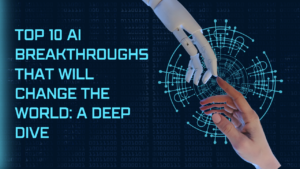Introduction to AI
I have always been fascinated by technology, especially the potential of artificial intelligence (AI) to revolutionize the way we live and work. As someone with a keen interest in technology, I find the rapid advancements in AI truly mind-boggling. In this blog post, I’ll share my perspective on the various ways AI is transforming the world and explore its far-reaching implications.
Table of Contents
AI Applications Across Industries
One of the things that excites me the most about AI is its broad applicability across industries. From healthcare to finance, retail to transportation, AI is making waves and driving innovation. Let me walk you through some of the most compelling applications I’ve come across:
Healthcare
I’ve been particularly intrigued by AI’s potential in personalized medicine. Imagine having your unique genetic profile, medical history, and lifestyle factors analyzed by an AI system to determine the most effective treatment plan tailored just for you. It’s a game-changer! AI is also revolutionizing medical imaging, enabling early disease detection that could save countless lives.
Finance
As someone who enjoys keeping an eye on the financial markets, I’m fascinated by how AI is being used for fraud detection and algorithmic trading. AI’s ability to analyze vast amounts of data and identify patterns is invaluable in this domain.
Here’s a table summarizing some key AI applications in finance:
| Application | Description |
|---|---|
| Fraud Detection | AI analyzes financial transactions to identify fraudulent activities in real-time. |
| Algorithmic Trading | AI-powered algorithms make data-driven investment decisions faster than humans. |
| Credit Scoring | AI assesses creditworthiness using alternative data like social media activity. |
Retail
I can’t help but appreciate the convenience AI brings to the retail experience. From personalized product recommendations based on my browsing history to dynamic pricing that ensures I get the best deals, AI is making shopping more enjoyable and efficient.
Transportation
The prospect of self-driving cars powered by AI is exciting and a bit daunting. While the idea of autonomous vehicles navigating roads safely is appealing, I can’t help but wonder about the ethical implications and safety concerns. AI’s ability to optimize routes and predict traffic patterns is undeniably valuable for the transportation industry.
Manufacturing technology
AI’s impact on manufacturing is something I find particularly impressive. Predictive maintenance, enabled by AI’s ability to analyze equipment data, can significantly reduce downtime and extend the lifespan of machinery. Additionally, AI-powered quality control systems can inspect products for defects, leading to improved product quality and reduced waste.
Education
As someone who values education, I’m excited about the potential of AI to personalize learning experiences. Imagine having an AI-powered virtual tutor that can adapt to your individual learning style and pace, providing personalized support and guidance 24/7. AI can also automate grading, freeing up instructors to focus on providing feedback and engaging with students.
Entertainment
AI’s applications in the entertainment industry are truly fascinating to me. The possibilities are endless, from personalized content recommendations that understand my preferences to more realistic and engaging game experiences powered by AI. I’m particularly intrigued by the idea of AI-powered virtual assistants that can manage my entertainment preferences and schedules.
The Rise of AI technology
Brief History
To fully appreciate the impact of AI, it’s important to understand its history and current state. I find the brief history of AI fascinating, tracing its roots back to the musings of thinkers like René Descartes and Alan Turing. The coining of the term “artificial intelligence” by John McCarthy in the 1950s marked the beginning of the field as we know it today.
Current State
The recent resurgence of AI, driven by factors like big data, powerful hardware, and algorithmic breakthroughs, is nothing short of remarkable. The availability of large datasets advances in GPU and specialized AI chips, and innovations in machine learning techniques like deep learning have propelled AI to new heights.
Here’s a table highlighting some key factors behind AI’s current state:
| Factor | Description |
|---|---|
| Big Data | An explosion of digital data provides vast training datasets for AI models. |
| Hardware Advances | Powerful GPUs and AI chips enable the training of complex models. |
| Algorithmic Breakthroughs | Innovations like deep learning lead to performance improvements. |
| Computing Power | Exponential growth in computing power allows for running large AI models. |
Future Outlook
As someone who loves to speculate about the future, I can’t help but wonder what lies ahead for AI. The convergence of AI with other emerging technologies like quantum computing and biotechnology is particularly intriguing. I’m also eager to see how advancements in AI hardware and software will shape the landscape in the years to come.
Some key trends and predictions for the future of AI include:
- Continued progress in deep learning algorithms
- Emergence of artificial general intelligence (AGI)
- Convergence of AI with other technologies
- Increased focus on AI safety and ethics
Recommendations for Businesses
As an avid observer of business trends, I strongly believe that companies across all industries need to embrace AI to stay competitive. Here are some recommendations I would make:
- Invest in AI Talent: Hire skilled data scientists, machine learning engineers, and AI researchers to build in-house capabilities.
- Partner with AI Companies: Collaborate with AI startups and tech giants to access cutting-edge technologies and expertise.
- Experiment with AI Pilots: Launch small-scale pilots to test AI’s feasibility and impact in your specific context.
- Develop an AI Strategy: Create a long-term vision and roadmap for how AI can be applied across your organization.
- Prioritize Data Infrastructure: Invest in robust data collection, storage, and processing capabilities to support AI initiatives.
- Address AI Ethics and Bias: Develop AI ethics frameworks, conduct bias testing, and ensure AI systems align with human values and regulations.
AI Specifications and Capabilities
I find the technical details of AI incredibly fascinating. Machine learning, deep learning, natural language processing, and computer vision are just a few of the powerful capabilities that make AI so versatile and valuable.
Here’s a table summarizing some key AI specifications and capabilities:
| Capability | Description |
|---|---|
| Machine Learning | Training algorithms on data to learn patterns and make predictions. |
| Deep Learning | Using artificial neural networks for complex tasks like computer vision. |
| Natural Language Processing (NLP) | Enabling computers to understand and generate human language. |
| Computer Vision | Interpreting and understanding digital images and videos. |
| Robotics | AI-powered robots that can perceive, learn, and perform complex tasks. |
| Generative AI | Models like GPT-3 and DALL-E that can generate human-like content. |
I’m particularly excited about the potential of generative AI models like GPT-3 and DALL-E, which can generate human-like text, images, and even code!
The Impact of AI on Society
As someone who values societal progress, I’m keenly interested in how AI will shape our future. From the future of work and the potential for personalization to the tantalizing prospect of artificial general
Here’s the continuation of the blog post with the remaining sections:
The Future of Work
AI will undoubtedly have a profound impact on the future of work. While it will automate many routine tasks and jobs, leading to disruptions in the workforce, AI will also create new types of jobs and augment human capabilities in many fields. I believe governments and businesses must proactively address the challenges of AI-driven job displacement and focus on reskilling workers to adapt to the changing job landscape.
Personalization and Customization
One of the most exciting aspects of AI for me is its ability to enable personalization and customization at an unprecedented level. From personalized medicine tailored to my unique genetic profile to hyper-targeted product recommendations based on my preferences, AI has the potential to make our lives more convenient and tailored to our individual needs.
Artificial General Intelligence (AGI)
While current AI systems are narrow and specialized, the prospect of developing artificial general intelligence (AGI) – AI with human-level abilities across many domains – is both thrilling and daunting. If achieved, AGI could lead to an intelligence explosion and radically transform the world as we know it. As someone fascinated by this possibility, I’m eager to see how research in this area progresses.
AI Ethics and Governance
As AI becomes more powerful and ubiquitous, it raises important ethical questions and challenges that we must address. Issues like AI safety, transparency, bias, privacy, and accountability need to be proactively tackled through robust AI ethics frameworks and governance structures. As an advocate for responsible AI development, I believe addressing these concerns should be a top priority for researchers, policymakers, and industry leaders.
Challenges and Limitations of AI
While AI holds immense promise, it’s important to be aware of its challenges and limitations. Data quality, interpretability, bias, privacy, and scalability are just a few of the hurdles we must overcome to fully realize AI’s potential.
Here’s a table summarizing some key challenges and limitations of AI:
| Challenge | Description |
|---|---|
| Data Availability & Quality | AI systems rely on large, high-quality datasets for training. |
| Interpretability & Explainability | Many AI models are “black boxes” difficult for humans to interpret. |
| Bias and Fairness | AI models can perpetuate and amplify human biases in training data. |
| Privacy and Security | AI systems rely on personal data, raising privacy concerns. |
| Scalability and Efficiency | Large AI models require significant computational resources. |
As an advocate for responsible AI development, I believe addressing these issues should be a top priority.
Case Studies
To illustrate the real-world impact of AI, let me share a few case studies that have caught my attention:
Personalized Medicine and Early Disease Detection: Companies like Tempus are using AI to match cancer patients with the most appropriate clinical trials based on their unique genetic profiles. Meanwhile, researchers at Stanford University have developed an AI system that can analyze medical images to detect diseases much earlier than human experts.
Fraud Detection and Algorithmic Trading: In the finance industry, AI is being used for real-time fraud detection by analyzing transaction data and user behavior patterns. Additionally, AI-powered algorithms are making data-driven investment decisions faster than human traders, potentially leading to higher returns.
Personalized Recommendations and Dynamic Pricing: Retailers are leveraging AI to provide personalized product recommendations based on customer behavior and preferences. AI is also enabling dynamic pricing strategies that adjust prices in real time based on demand, competition, and customer behavior.
These are just a few examples of how AI is already making a significant impact across various domains.
The Road Ahead
As we look to the future, the possibilities for AI are boundless. The convergence of AI with other emerging technologies like quantum computing, nanotechnology, and biotechnology is particularly intriguing to me. I can’t help but wonder how these synergies will shape the world in the decades to come.
Additionally, I’m eager to see how advancements in AI hardware and software will further push the boundaries of what’s possible. From more efficient algorithms and specialized AI chips to the development of neuromorphic hardware that mimics the human brain, the future of AI infrastructure is incredibly exciting.
Conclusion
In conclusion, I firmly believe that AI will continue to change everything in ways we can scarcely imagine. As someone passionate about technology and its impact on society, I’m excited to witness and participate in this transformative journey. Whether you’re a business leader, researcher, or simply a curious observer like myself, the age of AI is upon us, and it promises to be a fascinating ride filled with both incredible opportunities and complex challenges.
It’s up to all of us – technologists, policymakers, and society as a whole – to ensure that we steer the development and deployment of AI responsibly and ethically. By embracing the potential of AI while proactively addressing its limitations and risks, we can harness this powerful technology to create a better, more prosperous, and more equitable future for everyone.





